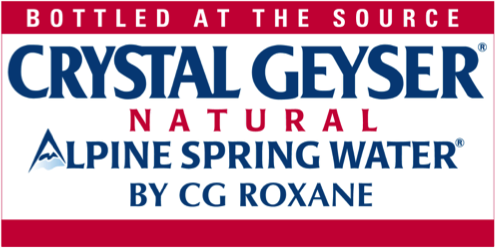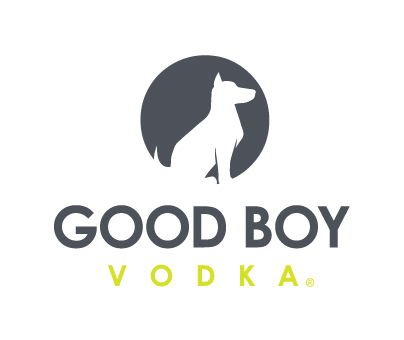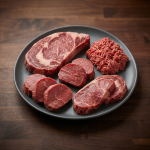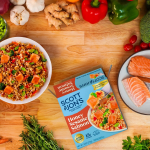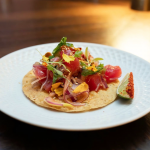Vegan Food Company Pangea Partners with H Mart for U.S. Launch of Plant-Based Patties
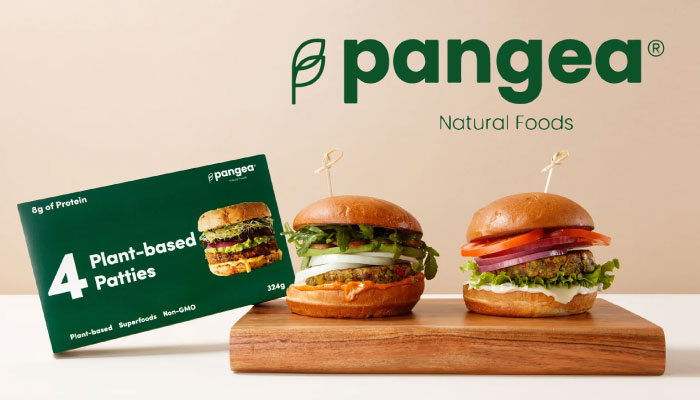
Pangea Natural Foods, a Vancouver, British Columbia-based vegan food company, is expanding into the U.S. through a distribution partnership with H Mart stores in Texas.
The food company started piloting its flagship product — a pea-protein, plant-based patty — in over 30 H Mart stores in June 2022, but the brand hopes to eventually expand to all H-Mart locations, CEO and president Pratap Sandhu told NOSH Thursday.
The company has been increasing its distribution rapidly since it launched in April 2021. Earlier this week, it announced increased distribution across Canada in over 23 IGA Marketplace stores and all seven Fresh Street Market retailers.
“We hope to be in over 400 locations by the end of the year,” Sandhu said, with an international distribution contract in the works that would expand Pangea’s reach from India to Europe.
The company makes just two other products besides its Plant-Based Patties: a trail mix called Munchie Mix and ghee from organic, grass-fed New Zealand butter.
Sandhu became interested in healthy eating while playing professional soccer internationally. He saw an opportunity in the vegan food market for products with minimal processing and few added ingredients.
“All these products were saying that they were healthy and vegan but if you actually look at nutritional facts there are a lot of added preservatives and a lot of things you don’t need. I felt like for us to separate ourselves was to make a real vegan product where you can see all the leaks, the peppers, the mushrooms, while providing the protein content,” Sandhu said.
Pangea’s handmade patties are not trying to mimic real meat burgers but rather target vegans and vegetarians who are looking for antibiotic-free, hormone-free and non-GMO products, Sandhu said. The Plant-Based Patties are made with pea protein with “only one binder” and a mix of locally-sourced ingredients like leeks, bell peppers, spinach, potatoes, black beans, carrots, chickpeas, mushrooms and breadcrumbs. A four-pack of patties retail for $8.49.
The company plans to release a plant-based chicken nugget in the next two months along with plans for other products in the future.
In November 2021, the company announced it had oversubscribed its $1.4 million seed investment round. The company began offering common shares on the Canadian Securities Exchange in July 2022.
“We want to have one product in every store in every aisle. We will never have a product that is not healthy and nutritious for you.”
Pangea manufactures its products at its facility in the Vancouver lower mainland that also manufactures products for the Sandhu family’s other business: Prabu Foods, a Bengali sweets and snacks company. Pangea is the first company founded by Pratap Sandhu. Sandhu’s partner in the company is food entrepreneur Alnasir Virani, who sold his family company Golden Boy Foods to Post in 2013 for CAD $320.
Pangea is launching in H-Mart because of the family’s prior connections to the retailer, but the choice to debut in a largely Asian grocery store chain could be fortuitous. According to Danone’s 2021 report At the Table: The Multicultural Plant-Based Food Perspective, in a survey of 4,000 shoppers 71% of Asian Americans respondents, compared to 49% of the total respondents, said they “‘strongly’ or ‘somewhat agree’ that they are open to substituting the current foods they eat with plant-based alternatives.”
At the same time, 52% of Asian American respondents said their communities or cultures were “‘not at all’ or ‘not that well’ represented by plant-based food companies.”
The apparent lack of attention devoted to Asian American shoppers stands in contrast to the weight that alt-protein brands have placed on the Asian markets, particularly China and Singapore. Eat Just, formerly known as Hampton Creek, last week announced it had raised $25 million from C2 Capital Partners, a firm with Alibaba as its lead investor. Part of the impetus in taking funding from C2, founder and CEO Josh Tetrick said in a release, was to help the cell-based meat and plant-based egg company further expand in China. Meanwhile alt-chicken brand TINDLE first debuted in Singapore before launching in the U.S.
There’s a reason for this interest. According to the Good Food Institute’s recent Asian Cropportunities report, consumers in Asian Pacific are not only more accepting of plant-based meat, but also see both sustainability and health benefits of making such a swap.
“Across rising economies in Asia, warning lights are flashing bright red for the future of animal agriculture,” the report notes. “Business as usual clearly cannot continue, which is why forward-thinking stakeholders from both the public and private sectors have begun to rally around more sustainable protein alternatives.”










